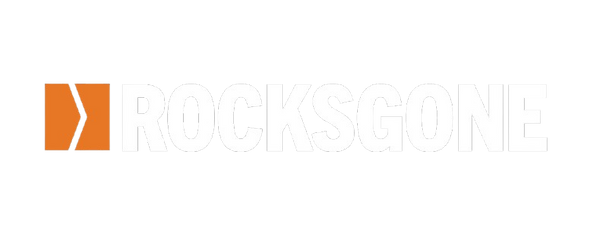 Photo caption: Pictured with Charlie Newman and his partner, Holly McDonald, as well as their dogs, Jack and Ed, the impressive Rocks Gone H4 Reefinator specialist rock crushing machine has been back in action after harvest on the Newman family’s properties south-east of Newdegate in WA. The machine has improved areas where they did not think gravel rock existed, increasing yields by 30-40 per cent, and they no longer break seeding points or damage machines at seeding.
Photo caption: Pictured with Charlie Newman and his partner, Holly McDonald, as well as their dogs, Jack and Ed, the impressive Rocks Gone H4 Reefinator specialist rock crushing machine has been back in action after harvest on the Newman family’s properties south-east of Newdegate in WA. The machine has improved areas where they did not think gravel rock existed, increasing yields by 30-40 per cent, and they no longer break seeding points or damage machines at seeding.
SOME areas of the Newman family’s cropping paddocks south-east of Newdegate in Western Australia have been unable to produce a crop or have achieved only half the average yield due to the rocky land, however a specialist rock crushing machine has since brought these areas back to near full crop production.
Charlie Newman and his partner, Holly McDonald, together with his parents, former CBH Chairman Wally Newman and his wife, Lee, crop up to 5000 hectares over five properties in the region. They grow wheat, barley, canola and oats and also run up to 4000 mated ewes, including for prime lamb production.
Charlie said typical coffee rock in the region featured in most of their paddocks, but was more prominent on their most southern property and could comprise 20-30 per cent of paddock areas.
“We still cropped everything, but in a lot of areas nothing would grow,” Charlie said.
The Newmans invested in the Rocks Gone H4 Reefinator rock crushing machine to target these areas, and they have since discovered other areas where they did not think the gravel rock existed.
The 3-metre wide H4 Reefinator comprises a levelling blade, four front row and five rear row hydraulic tines, and a following ribbed drum, all weighing 28-tonne when filled with water and digging up to 600 millimetres deep.
The Newmans pull the machine with a 620-horsepower Versatile DeltaTrack tractor, travelling at speeds of 10-11 kilometres per hour.
“It’s built like a brick shithouse. It’s the only machine on the farm we don’t worry about breaking,” Charlie said.
“We’ve had to make a few little adjustments, but nothing breaks and it’s pretty idiot-proof.”
The family has used the H4 Reefinator over the last three summers and is about halfway through their planned “reefinating” program.
“We have gone over some areas four to five times and we aim to dig about 250mm below the surface,” Charlie said.
“Other farmers in the area have contracted Reefinator machines to look at their worst areas, but I’m unsure if they are going to that depth.
“We worked out we could make our money back by buying a machine.
“We don’t need any more land. We want to get what we have got better. We thought it would be 5-10pc of our program, but there’s a lot of country that can be ‘reefinated’.
“It should improve our land value, and we understand we could sell the machine for more (than we bought it for) now.”
He said the potential with the machine was to lift the poor cropping areas due to the rock to near 100pc of the average paddock yields.
“Areas that were yielding 50-60pc of the average are now yielding 80pc plus. A yield increase of 30-40pc is significant.”
Charlie said following the “reefinating”, the family runs over the working with a smudge bar, comprising of welded railway line, to help level the land.
He said in average seasons, viewing crop responses where the machine had worked compared with elsewhere was “like night and day”.
“Depending on rainfall, in the first year you can expect a massive response. This season, with the dry start, the country that had four to five turns was struggling, but it later evened-up.”
“Weed control also can be a challenge if you don’t get a good knockdown opportunity, so we generally put canola in after reefinating.”
The Newmans are also no longer breaking seeding points or damaging machines during seeding, as a result of the H4 Reefinator transforming the land into some of their softest country. The family uses a Bourgault air drill and a Horsch disc seeder for their cropping program.
Meanwhile, Charlie said he was now keen to adopt new automation technology available with the Reefinator to help simplify the task for operators.
“It’s a very involved process and the automation will mean we can put anybody on the machine.”
The Rocks Gone ‘Depth Master’ auto depth and slip control system, suitable for ISOBUS and GPS-integrated tractors, calculates speed over ground and tractor load or wheel slip to adjust machine depth up to 50 times per second, as well as the level of its blade.
Operators previously had to perform on-the-go depth adjustments according to changes in land and rock conditions, however the automation has largely removed this pressure and also added other key benefits. They now set the depth and only make a manual adjustment if desired, thereby better optimising machine and tractor performance and resulting in improved crushing results and operational efficiency.
The technology also reduces tractor tyre wear considerably, and, in conjunction with GPS guidance systems, it can produce depth maps of worked areas, helping to limit any extra passes to specific areas.
Media information: Rohan Howatson, Howatson PR Communications, on 0407 428 459.
